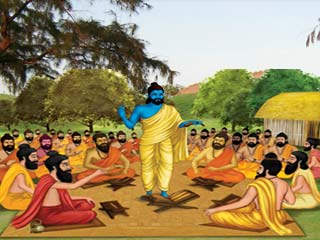Jallianwala Bagh Massacre (13 April 1919)
On the day of Vaisakhi on 13 April 1919, at around 4.30 pm, a meeting was organized at Jallianwala Bagh in Amritsar, in which about 20,000 people had gathered. General Dyer, along with some soldiers, stood at the main gate of the garden, ordering the removal of the crowd within 3 minutes and ordered to open fire, in which 1000 people were killed and 3000 were injured. Although government reports believe that 379 people were killed and 1200 were injured. In this massacre, an Indian named Hansraj had cooperated with Dyer.
Deenbandhu F. Andrews called the massacre a "deliberate" brutal murder. Even Montagu condemned it as preventive murder. At the time of Jallianwala Bagh massacre, the Lieutenant Governor of Punjab, Michael O. It was Dyer, who said in reference to this act of Dyer that- "Your action is right, the governor accepts it."
Events:-
Due to the ban on the entry of Gandhiji and some other leaders to Punjab, there was increased resentment among the people there. This anger increased when two popular leaders of Punjab, Dr. Satyapal and Saifuddin Kitchlew, were arrested by the Deputy Commissioner of Amritsar without any reason. In protest, the public took out a peaceful procession. The police prevented the procession from proceeding and, failing to stop the march, opened fire on the advancing crowd, resulting in the death of two persons.
The procession took a furious form, setting government buildings on fire and killing 5 people at the same time. Frustrated with the situation in Amritsar city, the government handed over the administration of the city to Brigadier General Dyer on 10 April 1919. He got some arrests done on 12 April. On the day of Baisakhi on 13 April 1919, a meeting was organized at Jallianwala Bagh in Amritsar at around 4:00 pm. Dyer, on the other hand, declared the assembly unconstitutional at 9:30 that day. Speeches were going on in the meeting against the release of Dr. Kitchlew and Satyapal and against the Rowlatt Act. In such a situation, General Dyer, ordering the removal of the crowd within 3 minutes, stood at the main gate of the garden with some soldiers, about 1650 bullets were fired at number 303, in which 1000 people were killed and 3000 were injured, according to the government report. 379 persons were killed and 1200 were injured.
After this barbaric murder case, martial law was imposed in Lahore, Gujranwala, Kasur, Sheikhpura and Wazirabad of Punjab on 15th April, in which about 298 persons were arrested and given various punishments.
Resignation and relinquishment:-
Indian member Shankar Nair resigned from the Viceroy's Executive Council in protest against the massacre.
Rabindranath Tagore in a fit of rage returned the title of "Sir" and also said that - "The time has come when the medals of honor make our stigma clear in the absurd terms of humiliation and as far as I am concerned I am all I want to stand with my countrymen, devoid of special titles.
Thomson and Garrett have written about this incident that - Amritsar accident was an epoch-making event in India-Britain relations, as was the revolt of 1857.
Formation of Hunter Committee:-
Hunter Committee The government in compulsion established a commission under the chairmanship of "Lord Hunter" on 1 October 1919 to investigate the Jallianwala Bagh incident. In this 8 member commission, 5 British and 3 Indian members were Chiman Setalvad, Sahabzada Sultan Ahmed and Jagat Narayan.
The Hunter Committee submitted its report in March 1920. Even before this, the government had passed the "Indemnity Bill" to save the guilty. The committee tried to cover up the entire matter. The Governor of Punjab was declared innocent. Laying the burden of blame on Dial, the committee said that - 'Dyer misunderstood his duties and used excessive force, but whatever he did, he did it sincerely.
The then India Secretary Montagu said that- 'General Dyer acted with the utmost good luck as he thought fit, so he made a mistake in understanding the situation properly.'
Dial was sentenced to be fired for his crime. British newspapers called him "the protector of the British Empire" and the British Lord's House called him the "lion of the British Empire". The government bestowed upon him the title of "Sword of Honor" for his services.
Indian National Congress Commission:-
The Indian National Congress appointed a commission under the leadership of Madan Mohan Malviya to inquire into this incident whose other members were Pt. Motilal, Gandhiji, Abbas Tyabji, C.R. Das and Pupul were Jayakar. The Congress-appointed inquiry committee, in its report, described the officers as deserving of condemnation for this barbaric act and urged the government to take action against the guilty and provide financial assistance to the families of the deceased. But the government did not pay any attention to it.
Result:-
As a result, Gandhiji formed the role of non-cooperation movement.
At the time of Jallianwala Bagh massacre, a Danda army was formed in Punjab under the leadership of Charandeep.
The members of the Danda Fauj, armed with sticks and cannons, patrolled the streets and pasted posters.




